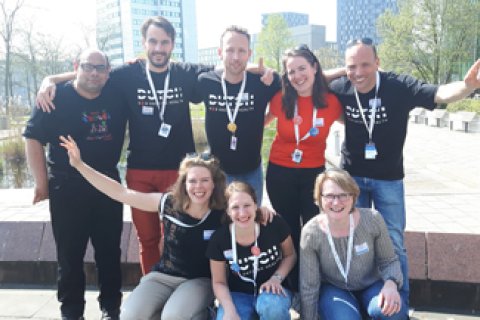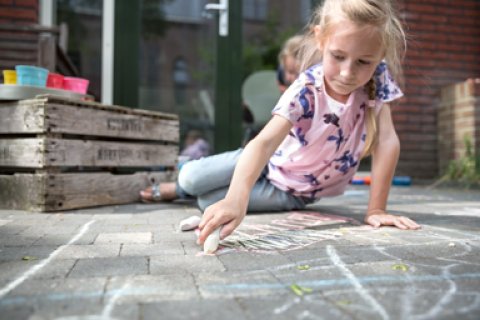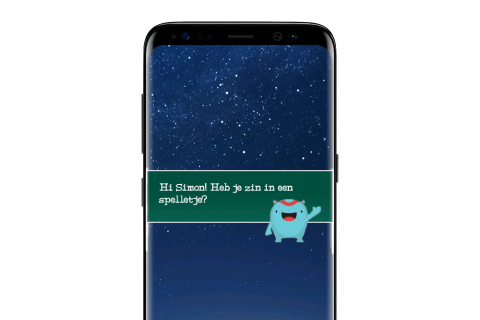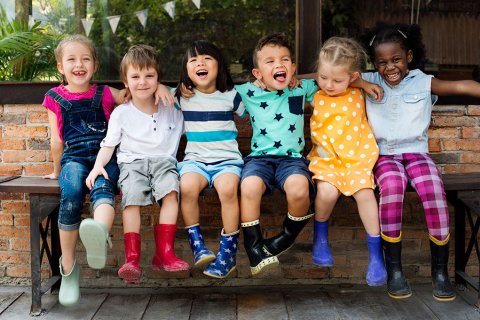Hip&Co: a games app for chronically ill children and their friends
Heidi Lesscher talks about the new serious game Hip&Co
Neurobiologist Heidi Lesscher, who studies social play in chronically ill children, participated in the Hacking Health Weekend at UMC Utrecht: 'We wanted to create a game that would facilitate chronically ill children in playing with others. I never could have imagined that we would have such a tangible product after just one weekend!' The team will be testing the Hip&Co game during the ‘As long as they’re happy!’ ('Als ze maar gelukkig zijn!') open day in the Wilhelmina Children’s Hospital.
Heidi Lesscher and her fellow team members Merel van der Vlist (Utrecht University) and Anouk Tuijnman (Trimbos Institute) were hoping to gain fresh ideas for a game that could give children with chronic illnesses more opportunities to play with their peers. Their search was fruitful, says Lesscher: "Seven people joined us during the hackathon: a graphic designer and a programmer from a game design company, a statistician who has experience working with educational games and children with mental health disorders, two IT trainees with backgrounds in biology, an industrial designer and an expert in the field of artificial intelligence."

A remarkable chemistry soon developed within the brand-new team. "Everyone was quite eager to do something to help sick children, which was an especially strong motivator." They laid out a plan on Friday evening, which they presented to the 16-year-old chair of the Wilhelmina Children's Hospital Children's Council the following morning in order to hear her feedback. "We asked her to share her thoughts on play in general and on the game we had invented. In addition, she asked other children on the Council which aspects they considered important." This process yielded extremely valuable input, according to Lesscher. "They asked some quite refreshing questions, such as 'did you consider that some kids are blind or deaf?' Their input kept us grounded in reality."
Exclusively for sick kids
One question in particular was an eye-opener for the whole team: 'Of course we’re very happy that you are developing this app for us, but will it stay exclusive to us?' Lesscher: "She was worried that the children for whom Hip&Co is intended would find themselves left out if the app became freely accessible to everyone. We discussed this aspect at great length. The app must remain a product exclusively for sick kids." As it stands now, the idea is that kids will receive the app via their care providers, after which they can invite their friends via the app itself. This procedure enables them to initiate play themselves.

Simply put, Hip&Co will be an overarching game that contains a large assortment of game ideas aimed at encouraging chronically ill children to instigate activities with their friends more often. Lesscher: "While these activities needn’t always be face-to-face, they are things that must be done together. By playing together, they will earn a key that will unlock the next stage of the game." So what types of games are we talking about? "There are a host of possibilities. One example is an escape room that you must work together to solve, bit by bit. It doesn’t have even to be digital: there are also instructions such as 'grab some chalk and go draw a Twister board on the pavement'."
I hope that the game gets them thinking: I can still take part and I can be part of the group after all.
It is crucial that the app is aligned to the abilities of each child. "We will be selecting game options based on what the child can handle." As this ability will of course be different for every individual, the app will tailor its content to a profile created by the child. The character of Hip will also communicate with the child directly, asking questions such as: How are you doing today? Do you feel like playing a game? Would you like to invite your friends? Based on the child’s answers, Hip will suggest games to try.

Just being a kid
Hip&Co is intended for children aged eight to twelve. "We are focusing on all children living with a chronic illness," Lesscher says. "However, it’s not about the illness itself, but about just being a kid and doing things together. At the moment, there’s no solution aimed at encouraging play for this group of children, while facilitating participation and 'just being a kid'. Like all children, sick kids crave a sense of belonging; we want to give them a way of initiating activities with their friends in their own environment, in a way that has nothing to do with being sick."
Children’s answers to Hip’s questions provide the researchers with valuable information as well. "Because they invite friends via the app, we are able to quantify how often they play and with how many other children they do so. This information allows us to learn more about social interaction and play. We will also ask questions about how they are feeling. How are you doing physically? Did you do any activities with your friends yesterday? Systematically asking these questions enables us to draw conclusions about the children's development, and the effect of the game on that development."
‘You are actually doing something to help us!’
Utrecht University, the Wilhelmina Children’s Hospital, the Trimbos Institute and the Municipality of Utrecht will hold an open day on Sunday 2 June with the theme ‘As long as they’re happy!’ ('Als ze maar gelukkig zijn!'). Lesscher: "We want to have some children play the game and ask for their input, so we can further improve the game and help it align even more closely with the wishes of chronically ill children."

How does Lesscher hope that Hip&Co will help chronically ill children in the near future? "I hope that the game gets them thinking. It should help them to think in terms of solutions when it comes to play: if I do this, I can still take part, it will still be fun and I can be part of the group after all. There are plenty of other ways to interact with one another. Once they’ve been playing the game for a while, I hope that the kids will answer the question of whether they did anything with their friends more often with a 'yes'. They should also experience less loneliness and begin to feel better about themselves in general."
"I never could have imagined that we would have such a tangible product after just one weekend," Lesscher says, beaming. "What I find to be really special is how well it is suited to benefit sick children. I hardly slept a wink that weekend, what with all the energy and ideas. In fact, I'm still abuzz! However, I’m ever so glad that I took part. As the chair of the Children's Council said: 'You are actually doing something to help us.' That thought alone is enough!"
Dr Heidi Lesscher is a neurobiologist at the Faculty of Veterinary Medicine and a researcher within the theme of ‘Healthy play, better coping’ at the hub Child Expertise Center.
Research on children and youth
In dealing with social problems, you need to start with the children. Utrecht University invests in resilient youth. Within the research theme Dynamics of Youth, scientists from all fields of expertise work together in order to better understand child development. How can we help young people to grow and thrive in our rapidly changing society?

